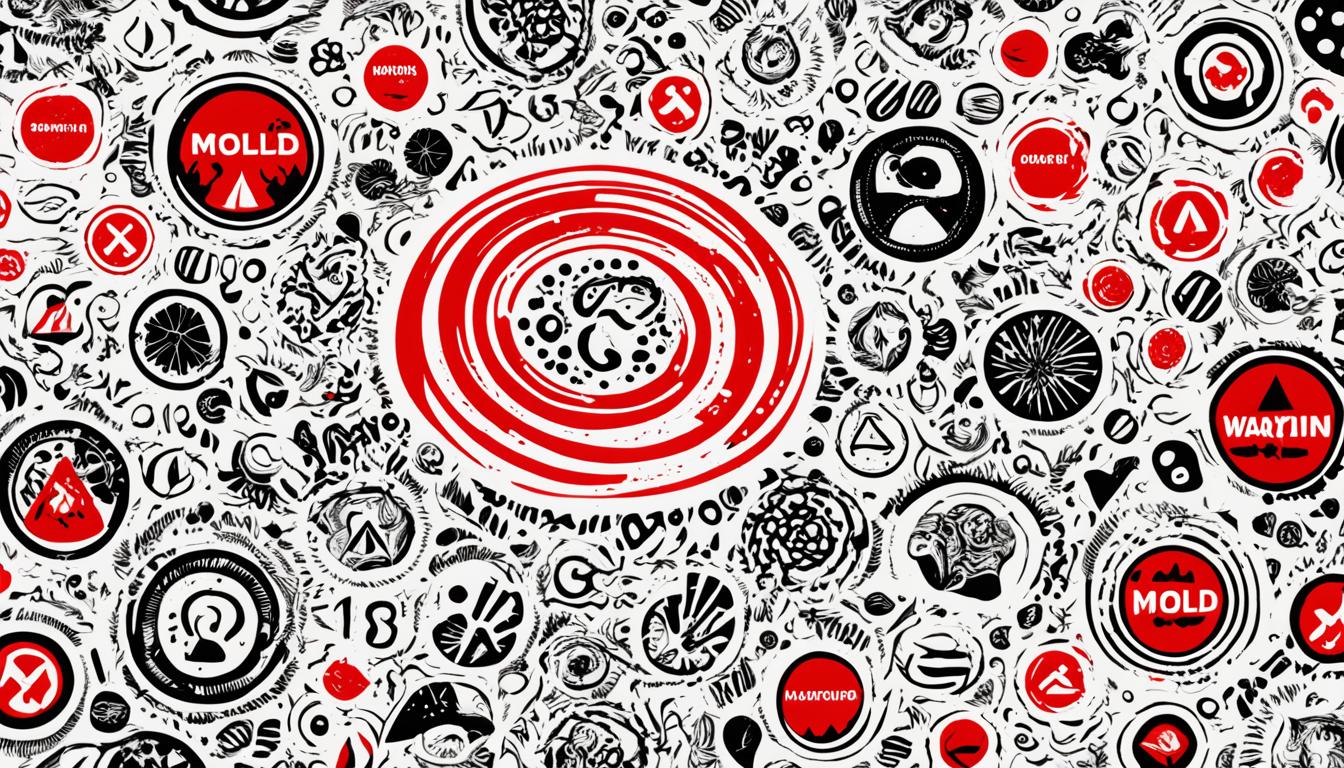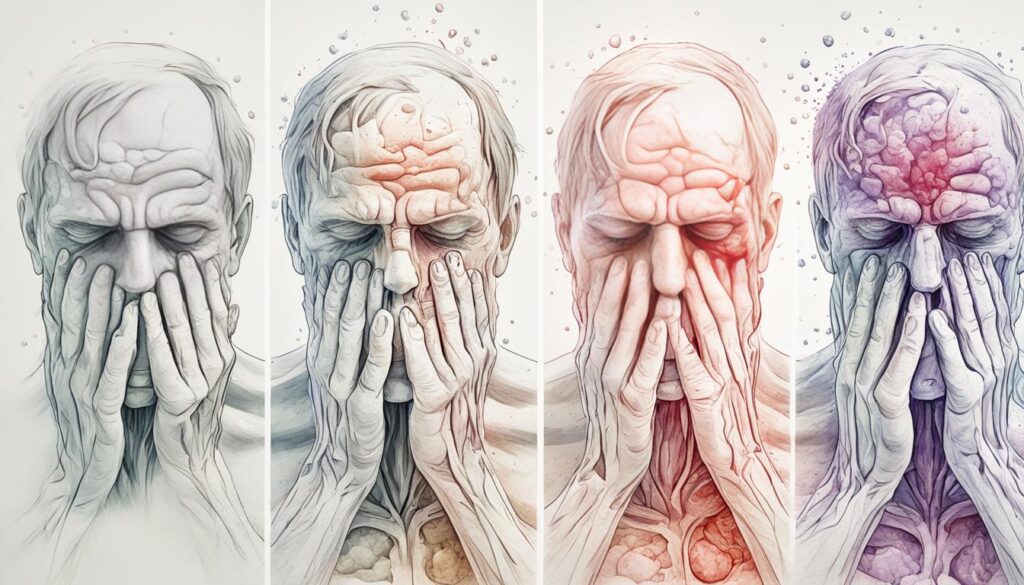
Discover the Secrets of 10 warning signs of Mold toxicity
Protecting your health and well-being is paramount when it comes to mold exposure. Mold toxicity can have serious effects on your respiratory system, skin, and overall health. Recognizing the warning signs of mold toxicity is crucial for taking appropriate action and seeking professional help, such as Fix Mold Miami, for a mold assessment.
In this section, we will explore the top 10 warning signs of mold toxicity and provide valuable insights into mold exposure symptoms. By familiarizing yourself with these signs, you can better understand if your health issues are related to mold exposure and take proactive measures to address them.
Key Takeaways:
- Recognizing the warning signs of mold toxicity is crucial for protecting your health.
- Mold exposure can have serious effects on your respiratory system, skin, and overall well-being.
- If you suspect mold exposure, it’s important to seek professional help, such as a mold assessment.
- Understanding the symptoms of mold toxicity can help you take proactive steps to address any potential health issues.
- By addressing mold issues promptly, you can create a healthier environment for yourself and your loved ones.
Understanding the Symptoms of Mold Toxicity
When it comes to mold exposure, recognizing the symptoms of mold toxicity is crucial for protecting your health. Mold exposure can lead to a range of health effects, including respiratory issues, allergic reactions, and even neurological problems. By understanding the warning signs of mold toxicity, you can take proactive steps to address any potential mold-related health issues.
Mold toxicity signs vary depending on the individual and the extent of mold exposure. However, there are common symptoms that people may experience when exposed to mold. These symptoms can manifest in different ways, and it’s important to be aware of them. Here are some of the most common mold exposure symptoms:
- Respiratory problems: Mold exposure can trigger respiratory issues such as coughing, wheezing, difficulty breathing, and sinus congestion.
- Allergic reactions: Many individuals develop allergies to mold, resulting in symptoms such as sneezing, itching, watery eyes, and skin rashes.
- Headaches: Exposure to mold can lead to persistent headaches or migraines.
- Fatigue: Mold toxicity may cause unexplained fatigue or feeling constantly tired.
- Brain fog: Some individuals may experience difficulty concentrating, memory problems, or a general feeling of haziness.
- Mood changes: Mold exposure can affect mood, leading to irritability, anxiety, depression, or even panic attacks.
- Sleep disturbances: People exposed to mold may have difficulty falling asleep or experience frequent waking during the night.
- Digestive issues: Mold toxicity can contribute to gastrointestinal problems, including nausea, diarrhea, or stomach cramps.
- Joint and muscle pain: Some individuals may experience achy joints, muscle stiffness, or general discomfort.
- Weak immune system: Mold exposure can weaken the immune system, making individuals more susceptible to infections and illnesses.
Recognizing these mold toxicity signs is essential for seeking timely medical attention and taking appropriate measures to address the underlying cause. If you suspect mold exposure or experience any of these symptoms, it is recommended to consult with a healthcare professional. They can help diagnose your condition and guide you through the necessary steps to improve your health.
“Understanding the symptoms of mold toxicity is crucial for protecting your health and well-being.” – Dr. Sarah Thompson

| Symptoms | Effects |
|---|---|
| Respiratory problems | Can lead to coughing, wheezing, difficulty breathing, and sinus congestion. |
| Allergic reactions | May result in sneezing, itching, watery eyes, and skin rashes. |
| Headaches | Can cause persistent headaches or migraines. |
| Fatigue | May result in unexplained fatigue or feeling constantly tired. |
| Brain fog | Can lead to difficulty concentrating, memory problems, or a general feeling of haziness. |
| Mood changes | May contribute to irritability, anxiety, depression, or panic attacks. |
| Sleep disturbances | Can cause difficulty falling asleep or frequent waking during the night. |
| Digestive issues | May result in nausea, diarrhea, or stomach cramps. |
| Joint and muscle pain | Can lead to achy joints, muscle stiffness, or general discomfort. |
| Weak immune system | Can weaken the immune system, making individuals more susceptible to infections and illnesses. |
The Top 10 Warning Signs of Mold Toxicity
Recognizing the symptoms of mold toxicity is crucial for safeguarding your health. Mold exposure can lead to a range of health issues, so it’s important to be aware of the warning signs. Here are the ten most common symptoms of mold toxicity:
- Respiratory Issues: Persistent coughing, wheezing, or shortness of breath can be indicators of mold exposure.
- Allergic Reactions: Sneezing, runny nose, itchy eyes, and skin rashes are common allergic responses to mold.
- Headaches: Frequent headaches or migraines may be a sign that you’re being exposed to mold.
- Fatigue: Feeling constantly tired, even after getting enough rest, can be a symptom of mold toxicity.
- Brain Fog: Difficulty concentrating, memory problems, and confusion may indicate mold-related illness.
- Unexplained Muscle Pain: Mold exposure can lead to muscle aches and joint stiffness without any obvious cause.
- Digestive Issues: Chronic nausea, stomach pain, diarrhea, or vomiting could be signs of mold toxicity.
- Skin Irritation: Rashes, hives, or itching that doesn’t go away may be related to mold exposure.
- Sensitivity to Odors: An increased sensitivity to strong smells or chemical odors can be a sign of mold illness.
- Mood Swings: Mold toxicity can impact your mental well-being, leading to irritability, anxiety, or depression.
If you experience one or more of these symptoms and suspect mold exposure, it’s essential to take action. Consult with a healthcare professional and consider contacting a mold remediation specialist to address any potential mold issues in your home or workplace.

Conclusion
In conclusion, recognizing the warning signs of mold toxicity is crucial for safeguarding your health and well-being. Mold exposure can have serious consequences on your respiratory system, immune system, and overall quality of life. By being aware of the symptoms associated with mold exposure, you can take proactive steps to address any potential issues.
If you suspect mold exposure in your environment, it is essential to seek professional help. Fix Mold Miami is a trusted company that specializes in mold assessments and remediation. Their team of experts can accurately assess the presence of mold in your home or workplace and provide effective solutions to eliminate it.
Addressing mold issues promptly is vital to creating a healthier environment. Mold can thrive in damp and poorly ventilated spaces, leading to the growth of harmful spores. By taking action to mitigate mold growth, you can improve the air quality in your surroundings and reduce the risk of mold-related health problems.
Remember, your health should always be a top priority. Stay vigilant for any signs of mold toxicity and take the necessary steps to protect yourself and your loved ones. By staying informed and proactive, you can ensure a healthier and safer living environment.




